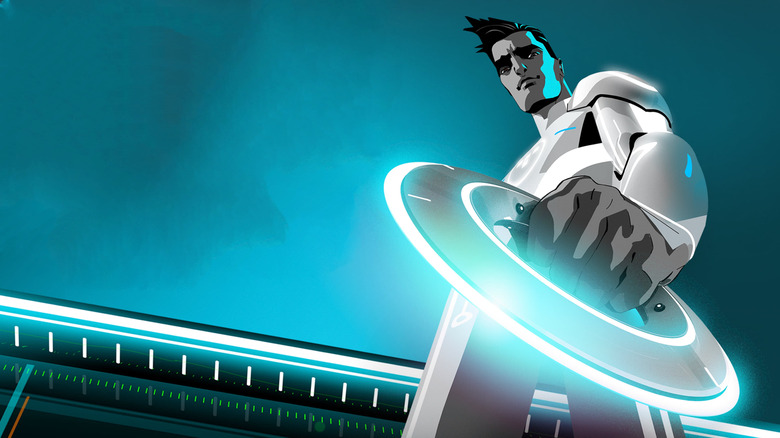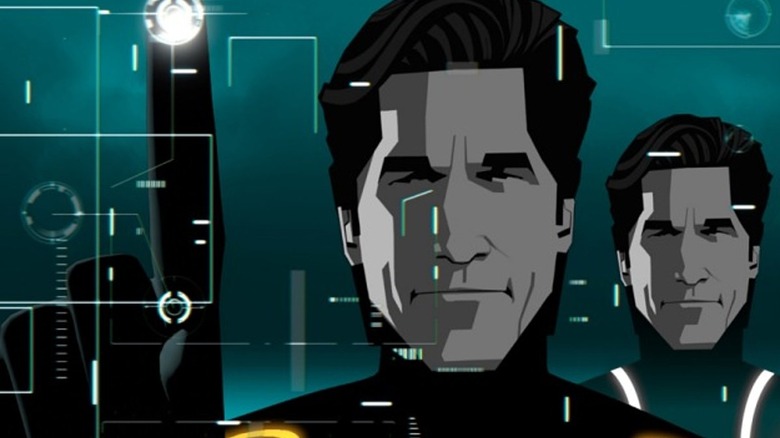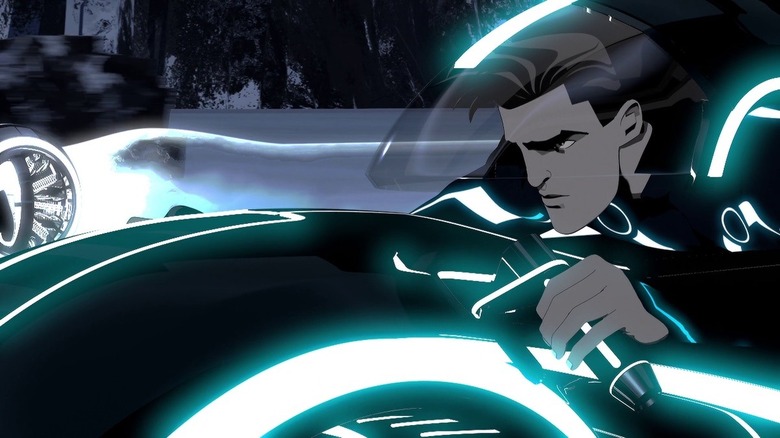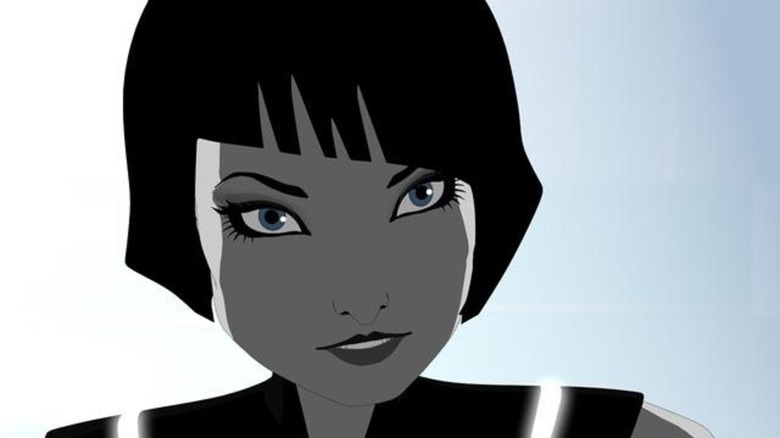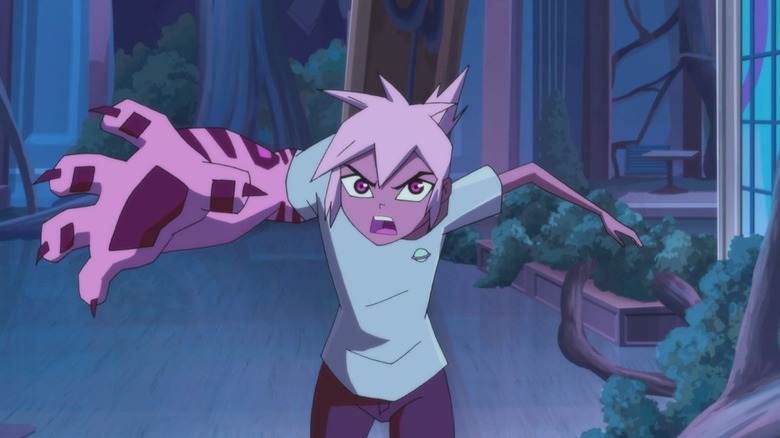Tron: Uprising Writer Bill Wolkoff On Abandoned Season 2 Plans, Notes About Comedic Sidekicks, & More [Interview]
We may receive a commission on purchases made from links.
(Welcome to My Most Ridiculous Note, a series of interviews in which animators talk about the weirdest and funniest notes they received from studio executives.)
In June 2022, "Gravity Falls" creator Alex Hirsch took to Twitter to share some of the very real and very ridiculous notes he received from Disney when working on the award-winning cartoon. That inspired this new series of interviews titled "My Most Ridiculous Note," in which we talk to animators, writers, and directors about the cartoons they've helped make, and the weird (and, at times, funny) notes they got from studio executives along the way.
First up is Bill Wolkoff, a writer on "Tron: Uprising," the animated prequel series to the underrated "Tron: Legacy." This cartoon, which ran from 2012-2013, vastly expanded on the lore of the live-action movies, delivering a mature, action-heavy, and complex animated series that was unlike anything else Disney did at the time.
"Tron: Uprising" takes place after Clu tyrannically takes control of The Grid, and it follows Beck, a mechanic program who becomes tired of Clu's rule and starts training under Tron to take up his mantle and become the leader of a revolution, ready to fight back against the brutal military occupation of his city. It also has a killer cast that includes Elijah Wood, Mandy Moore, Lance Henriksen, Paul Reubens, Kate Mara, Aaron Paul, and David Arquette.
Tron: Uprising had an infinite number of stories to tell
Because of the slow process of producing animation, "Tron: Uprising" came out two years after "Tron: Legacy," even though it went into production long before the live-action movie was released. That meant the only visual point of reference the writers and animators had on the new film was a short teaser. Instead, the writers would go, one at a time, into the office of a Disney executive to individually read the script on paper without leaving that office so as to get a sense of where the story was going and who the main players would be.
"We knew that Tron was going to turn into Rinzler, and we knew that he would be completely taken over by Clu," Bill Wolkoff recalled. "That was a big rail that we had, but everything else was up for grabs."
This translates to "Uprising" feeling more like a natural progression from the original "Tron" rather than just a prequel to "Legacy," in the sense that the cartoon has such a large canvas to play with, but it also has the right amount of foreshadowing that avoids tired sequel tropes while still building the foundation of the next chapter of the story. We get to see a bit more of Flynn's plans for The Grid before Clu betrayed him and learn more about the ISOs within the context of this story, rather than simply as a nod to the live-action movie. "We didn't have to be worried about breaking canon or anything," Wolkoff adds.
"We had an infinite number of stories that we could tell with [the characters of the show], to get to the point where Tron is eventually taken by Clu."
Indeed, while the ISOs are a part of this show, the thematic focus of "Tron: Uprising" lies with Beck and how he managed to go beyond his original programming and defy the box he was assigned to at birth. "It was an interesting parallel to our world, with the roles that we feel are imprinted on us."
A visually distinct show that few people watched
This show felt like nothing else on Disney XD at the time, with impactful action, mature topics, and a story that was narratively complex while simultaneously being accessible to all audiences. It also just looked rad as hell, with an animation style that mixes CGI and 2D animation, with an art style by Oscar-winner Alberto Mielgo, who helped develop the look of "Spider-Man: Into the Spider-Verse," and character designs by Robert Valley, the animation artist for Gorillaz.
The problem, at least as far as Bill Wolkoff sees it, is that Disney never figured out the right way to market the show so it could find an audience. It was a bit too grown up compared to other Disney XD cartoons of the time, but it was still a Disney XD show, so adult "Tron" fans didn't exactly come in waves to watch the show.
"I think if we had come out five years later, maybe six years later, in the time when streaming was bigger and more of a presence, we would have found a better audience," he says.
Not that the studio was against the show, as Wolkoff credits them for investing a lot in the franchise, wanting it to succeed, and hoping for it to "become their big sci-fi franchise." But even if Wolkoff recognizes there were guardrails like never being able to explore queer relationships, what ultimately killed the show was that it was "never marketed in a way to connect with the audience that would've embraced and loved our show," but to fit what was on Disney XD at the time, which was more sitcom-oriented. And when "Uprising" failed to find an audience and "Legacy" failed to be a blockbuster hit, Disney looked elsewhere for their big sci-fi franchise. Around the time "Tron: Uprising" got canceled, Disney announced they were acquiring Lucasfilm.
Studio notes and plans for Tron: Uprising Season 2
One thing Bill Wolkoff says might have helped the show came from a series of studio notes, all fixated on a one-off character the team brought back from the original film: Bit, a binary program that's kind of a comic-relief sidekick. He may have only interacted with Mara for a couple of scenes, but that didn't stop studio executives from fixating on its potential. "We got a lot of questions like, 'When's Bit coming back? Where's Bit? We love Bit,'" Wolkoff said, almost like he was talking about Poochie from "The Simpsons." The writer said that, had the show continued with a second season, Bit would've been featured much more prominently in order to fit the more comedic tone Disney XD was known for.
The public only got a 19-episode first season and nothing else, but Wolkoff says Season 2 was already well underway by the time the show officially got the can.
"When the show premiered, we had written the TV movie [which would connect with season 2]," Wolkoff recalled. "They kept me and Adam Nussdorf, and two other writers, on to write a Season 2 [...] we were writing Season 2 and we were deep into writing Season 2. I think we had written about six scripts."
One of the things that would have made it to Season 2 was a larger role for the ISOs that serve an integral role in "Tron: Legacy" — particularly Olivia Wilde's Quorra, who had a brief cameo in one of the episodes. On Twitter in February 2021, Wolkoff also shared pages of a script for the movie which could have brought back Daft Punk. Likewise, Wolkoff teased that the second season would have expanded on the different kinds of programs introduced in the films, like all the silent and faceless sentries we see in the original.
"What does [having no face or voice] mean for those programs?" he says, thinking back to the questions they were asking at the time. "So we had a lot of talks about [that], and we had episodes that we had written and planned for, that really get into the idea of what sentries are, that, alas, we never got to make."
The age of wonderbeasts
Bill Wolkoff was also involved in the wonderful Netflix cartoon "Kipo and the Age of Wonderbeasts," this time developing it from the ground up with creator Radford Sechrist. The show deals with a post-apocalyptic world where animals and insects have mutated to enormous sizes and to superb intelligence, becoming the dominant species on the surface and forcing the remaining humans underground.
As Wolkoff tells it, he was most nervous about dealing with a studio as big as DreamWorks, but even when the story had a relatively slower pace than most other DreamWorks shows, and even though the show had a gay kid as a main character, the studio didn't have many notes. "There was a little bit of resistance, not to the idea of having a queer character," remembers Wolkoff, "but just the idea of having romance at all in a kid's show, was something [DreamWorks] didn't traditionally do."
Now, the one set of ridiculous notes Wolkoff and his team did get often was from Netflix. "Kipo and the Age of Wonderbeasts" was always bought as a 30-episode show, but as Wolkoff tells it, "I was trying to shoot for more of a five-season run" and tried to structure things in the story to last for those five seasons. But the studio didn't like that, and many of the notes were along the lines of, "How are you going to finish the show in three seasons, if you don't speed up this benchmark?" This meant accelerating the story so that Kipo became the Mega Jaguar in the first season rather than later.
It may have been the creators' intent to continue the story, but as it stands, we got a rather rare show, one that told a complete story with an ending that tied up all loose ends and paid off the themes of the show in a satisfying way. Kipo's story was one of resilience, inclusivity, and strange creatures, and it remains one of the best cartoons ever from Netflix.
"Tron: Uprising" is streaming on Disney+ and can be purchased on Prime Video. "Kipo and the Age of Wonderbeasts" is streaming on Netflix.
